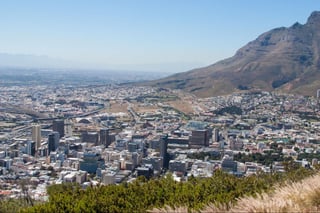Amidst a backdrop of uncertainty, South African tourism is displaying promising signs of recovery. As the country grapples with complex geopolitical shifts, airline industry changes, and safety concerns, the resilience of its tourism sector shines through.

The COVID-19 pandemic had a devastating impact on South African tourism, one of the country's key economic sectors. In 2020, international tourist arrivals to South Africa declined by 72%, and domestic tourismspending fell by 60%. This led to significant job losses and business closures across the tourism industry.
The pandemic had a number of direct and indirect impacts on South African tourism. The direct impacts included:

The indirect impacts of the pandemic on South African tourism included:
The recent recovery in tourist arrivals in South Africa has been a promising development for the country's tourism industry. Several key factors have contributed to this positive trend:
As vaccination efforts progressed and COVID-19 cases decreased, South Africa gradually eased travel restrictions. This move allowed international travellers to return, boosting arrivals.
Many travellers had postponed their trips due to the pandemic, resulting in pent-up demand. Once conditions improved, there was a rush to visit South Africa, particularly among those who had longed for safaris, cultural experiences, and outdoor adventures.
While international arrivals increased, domestic tourism remained robust. South Africans continued to explore their own country, supporting local businesses and tourist destinations.
The South African government and tourism authorities launched marketing campaigns to reassure travellers about safety measures in place. Clear communication about health protocols and vaccination efforts helped restore confidence.
South Africa's natural beauty and outdoor attractions, including wildlife safaris and pristine landscapes, continued to draw travellers seeking COVID-safe destinations.
The potential adoption of vaccine passports for international travel facilitated entry for vaccinated tourists, further encouraging visits to South Africa.
Despite the challenges posed by the pandemic, the South African tourism industry demonstrated resilience by adapting to changing circumstances and finding innovative ways to provide safe and enjoyable experiences.
The South African tourism industry continues to grapple with significant challenges, hindering its path to full recovery and growth as discussed below:
The future of South African tourism presents a mixed outlook, with opportunities for recovery and growth countered by ongoing uncertainties and obstacles.
How has South African tourism shown signs of recovery?
South African tourism has shown signs of recovery through an increase in international and domestic tourist arrivals, eased travel restrictions, and marketing efforts to boost traveller confidence.
What contributed to the recent recovery in South African tourism?
Factors contributing to the recovery include pent-up demand, successful vaccine rollouts, the appeal of nature-based tourism, and robust domestic tourism.
What challenges does the South African tourism industry still face?
Challenges include ongoing COVID-19 variants, economic struggles for tourism businesses, safety concerns, geopolitical shifts, and the need for airline industry stability.
How is South Africa addressing safety concerns for tourists?
South Africa is considering the formation of a special tourist police force to enhance safety and security for tourists.
What is the role of vaccine passports in South African tourism's recovery?
Vaccine passports are seen as potential tools to restore traveller confidence and facilitate international travel, contributing to the industry's recovery.
How can South Africa balance tourism growth with environmental sustainability?
Balancing growth with sustainability involves implementing eco-friendly practices, conserving wildlife habitats, and promoting responsible tourism.
Step1: Complete the online application by providing your passport details.
Step2: Submit payment online using a credit card.
Step3: Monitor your email for confirmation of payment and receipt of your eVisa, which will be sent electronically.
To help us improve